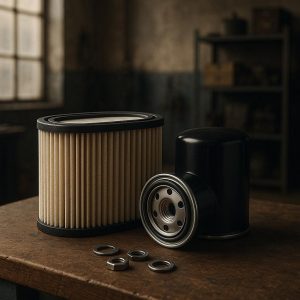When we think about automotive pollution and sustainability, we often focus on fuel consumption, CO₂ emissions, or electric vehicles. But there’s another critical component that quietly plays a role in both vehicle performance and environmental impact — car filters.
Car filters might be small, inexpensive parts, but they have a big job: protecting your car’s internal systems and, indirectly, the planet. In this article, we’ll explore how different types of car filters contribute to environmental health and what you can do as a responsible car owner.
Types of Car Filters and Their Environmental Role

Let’s break down the major filters in your car and how each relates to environmental performance:
| Filter Type | Purpose | Environmental Contribution |
|---|---|---|
| Engine Air Filter | Removes dust and debris from air intake | Improves fuel efficiency and reduces emissions |
| Oil Filter | Cleans engine oil of contaminants | Prevents oil degradation and extends engine life |
| Fuel Filter | Filters out impurities from fuel | Ensures clean combustion and lowers harmful exhaust gases |
| Cabin Air Filter | Filters air entering the cabin | Improves air quality for passengers and reduces pollutant exposure |
| Transmission Filter | Cleans transmission fluid | Maintains drivetrain efficiency, indirectly improving fuel economy |
How Dirty Filters Harm the Environment
Neglecting filter replacement doesn’t just affect your vehicle’s health — it can contribute to environmental degradation in the following ways:
Increased Emissions
-
Clogged air filters restrict airflow, forcing the engine to burn more fuel.
-
Dirty fuel filters reduce combustion quality, increasing hydrocarbon and CO emissions.
-
Worn oil filters allow sludge buildup, affecting engine efficiency.
Higher Fuel Consumption
-
Engines compensate for restricted air or dirty fuel by burning extra fuel.
-
Poorly maintained systems demand more energy, reducing fuel economy.
Poor Air Quality
-
Cabin filters filled with pollutants no longer trap allergens, dust, or exhaust particles.
-
This affects both passengers and the external environment if recirculation systems are overloaded.
Environmental Benefits of Timely Filter Maintenance
| Action | Environmental Benefit |
|---|---|
| Replacing air filters regularly | Reduces engine load and fuel usage |
| Keeping oil filters clean | Minimizes engine wear and oil waste |
| Maintaining cabin filters | Reduces airborne particles and in-car pollution |
| Using recyclable filters | Reduces landfill impact and promotes sustainability |
| Choosing eco-friendly brands | Supports greener manufacturing practices |
Are Filters Recyclable?
Yes — many filters can be recycled, but it depends on local regulations and the type of filter:
Recyclable Components:
-
Metal casings in oil and fuel filters
-
Paper elements in air filters (if separated properly)
-
Plastic housings in cabin filters (depending on grade)
Hazardous Waste Considerations:
-
Used oil and fuel filters are considered hazardous due to residual fluids.
-
Must be disposed of at designated recycling or hazardous waste centers.
Sustainable Choices for Eco-Conscious Drivers

Want to reduce your environmental footprint as a car owner? Here are some practical tips:
Maintenance Tips
-
Replace filters according to your car’s service schedule
-
Choose washable or reusable air filters (if compatible with your vehicle)
-
Ensure proper disposal of used filters via auto service centers
Product Choices
-
Look for filters from brands with eco-certifications
-
Use low-emission, high-efficiency filters for better fuel-air mix
-
Select cabin filters with activated carbon for pollutant trapping
Long-Term Environmental Impact
Neglecting filter maintenance may seem trivial day-to-day, but multiplied across millions of vehicles, the environmental cost adds up:
| Neglected Filter | Environmental Consequence |
|---|---|
| Engine Air Filter | Higher emissions, more fuel burned |
| Oil Filter | Contaminated oil entering the environment during oil changes |
| Fuel Filter | Inefficient combustion = more unburnt hydrocarbons released |
| Cabin Filter | Greater exposure to allergens and smog particles |
Responsible Ownership Starts Here
Caring for your filters means:
-
Your engine breathes cleaner,
-
Your car runs smoother, and
-
The planet benefits, too.
Whether you’re replacing a single filter or doing a full tune-up, use products you trust and dispose of the old ones responsibly.
Want to simplify your maintenance routine?
Buy car filters online — get high-quality OEM and aftermarket filters delivered to your door.
Conclusion
While car filters may not seem like environmental warriors, their role is more impactful than most people realize. By ensuring timely filter replacements and making thoughtful product choices, you reduce emissions, improve air quality, and prolong your vehicle’s life — all while contributing to a healthier planet.
So next time you pop the hood, remember: Clean filters = Clean air.